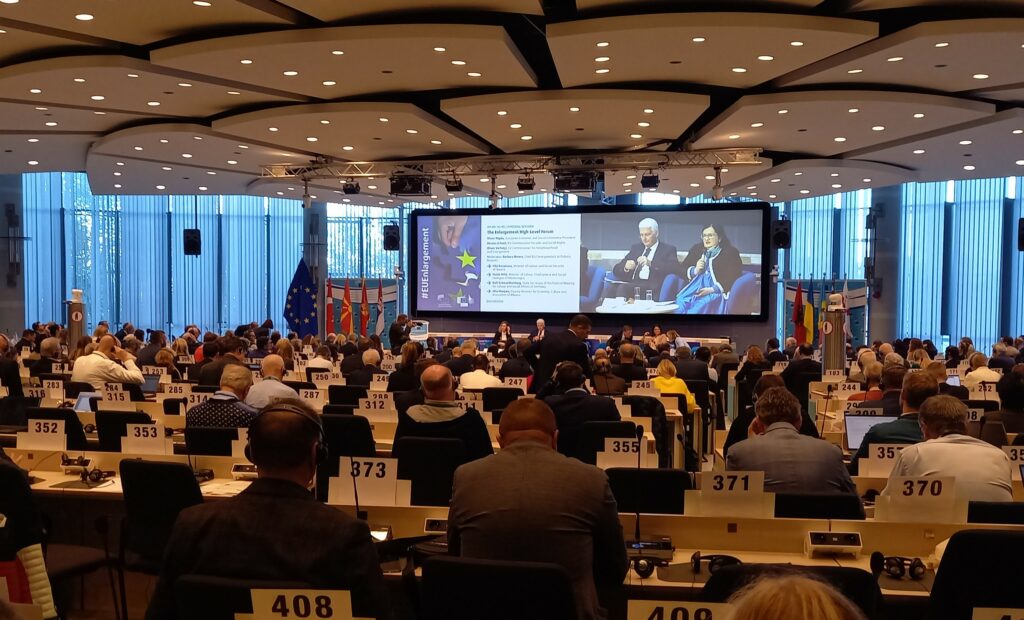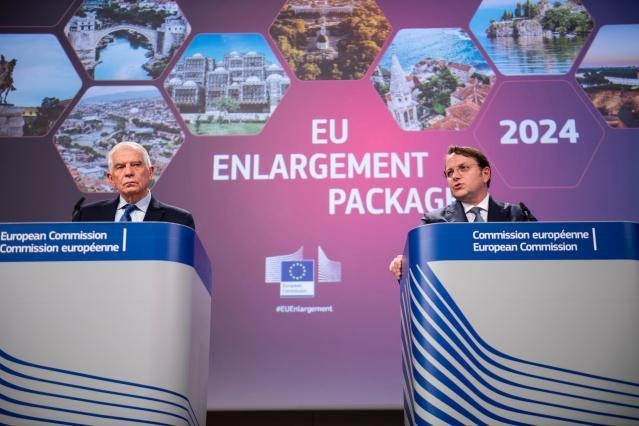The European Commission adopted last week its annual enlargement package providing a detailed assessment of the state of play and the progress made by 10 hopeful candidate countries on their respective paths towards accession to the EU.
As last year, the package was described as historic because it for the first time since the enlargement round in 2004 included ten countries, nine of which have been granted formal EU candidate status and one (Kosovo) is a potential candidate country which has applied for joining the EU. Kosovo’s accession path is closely linked to that of Serbia because without normalizing their bilateral relations none of them can become EU members.
The ten candidate countries are Albania, Bosnia and Herzegovina, Kosovo, Montenegro, North Macedonia, Serbia (all of them located in the Western Balkans), Turkey, Ukraine, Moldova and Georgia. The Commission writes that enlargement is a historic opportunity, both for the acceding countries and for the current Member States, as well for the EU as a whole to become “bigger and stronger”.
This was the fifth and last enlargement package by the outgoing von der Leyen Commission. Josep Borrell, High Representative for EU’s foreign affairs and security policy, and Olivér Várhelyi, Commissioner for Neighbourhood and Eenlargement, presented the package at a press conference on Wednesday (30 October).
Borrell will soon finish his EU career, leaving unfinished business in the Western Balkans, in particular the Belgrade -Pristina dialogue which he has facilitated. Várhelyi will stay as Commissioner for health and animal welfare in the second von der Leyen Commission. It is expected to get started soon after the hearings in the European Parliament. “Enlargement will remain a top priority of the new Commission,” von der Leyen promised.
Both Borrell and Várhelyi dwelt on the positive achievements during the outgoing Commission, especially since the previous enlargement package, and played down the current challenges that are slowing down the accession process in all candidate countries. The enlargement process gained some new momentum throughout 2023 and 2024.
The fundamentals cluster was opened with Albania in October 2024. The screening process has been completed with both Albania and North Macedonia. Accession negotiations were opened with Ukraine and Moldova at the first intergovernmental conferences in June 2024. Montenegro is on the way to provisionally closing further negotiating chapters. In March 2024, the European Council decided to open accession negotiations with Bosnia and Herzegovina
Key take aways
Referring to Russia’s war of aggression against Ukraine, High Representative Borrell underlined that, “Now more than ever, EU membership is a strategic choice. Alignment with EU values, starting with the rule of law, and the EU’s Common Foreign and Security Policy is the most significant indication of strategic orientation in the new geopolitical context”.
Among the candidate countries, Ukraine seems to be the only country which has made major progress in the very short time since it was recognized as a candidate country, and that at the same time as it is defending itself against Russia’s aggression. Following the first intergovernmental conference in June 2024, the analytical examination of the EU acquis (the screening) is progressing smoothly.
The Ukrainian negotiation team of ca 300 persons is led by Olha Vitaliivna Stefanishyna, Ukraine’s energetic minister of justice. At a seminar in Brussels in September she mentioned the internal pressure and support from civil society and the public calls for involving them in the accession process. She also agreed that Ukraine’s supreme audit institution (NCU) plays an important role in the process.
Unfortunately, only some candidate countries are fully aligned with EU’s common foreign policy. The latest setback occurred in the recent parliamentary elections in Georgia, which were marked by serious irregularities, which need to be addressed, legislation which must be repelled, and Russian manipulative disinformation.
In a previous statement, Borrell referred to the preliminary assessment of the international election observer mission but added that he looked forward to the final report and its recommendations as soon as possible. That could take two months. Already the preliminary findings confirmed the need for a comprehensive electoral reform. In the meantime, Geogia’s EU accession process is de-facto halted.
As regards Turkey, the largest candidate country, the accession process has been suspended since 2018 because of democratic backsliding, Borrell admitted that its alignment with EU’s foreign policy, as reported last year, is very low and decreasing. But as Turkey is considered a key partner for the EU, relations with Turkey have been marked by a gradual re-engagement.
No clear frontrunner
Borrell was pressed to defend his legacy when asked if he felt responsible for the failed dialogue between Kosovo and Serbia. The EU agreement on normalisation of their relationship, which he proposed in February 2023, is not being implemented and has not even been signed by the two countries. He admitted that everything can be done differently and that the process has been derailed.
“This process is about normalisation, not recognition which will come at the end of the process,” he said. “Things will have to go step by step.” He did not explain how normalisation can be implemented without any Serbian recognition of Kosovo’s independence. Furthermore, five EU states do not recognise Kosovo's independence: Spain, Slovakia, Cyprus, Romania, and Greece.
Another country which is lagging behind, despite being a candidate country since 2005, is North Macedonia. First if was because of the name issue with Greece and now it is the bilateral issue with Bulgaria on amending its constitution to include the small Bulgarian minority as one of the recognized minorities in the country.
This had been one of Bulgaria’s conditions to drop its veto against starting the accession negotiations. But besides that, North Macedonia also needs to continue to deliver on the implementation of EU-related reforms, in particular under the fundamentals cluster, notably the judiciary, the fight against corruption and organised crime.
Considering its 20 years of being a candidate country, it should by now have been a frontrunner in the accession process. But there is no clear frontrunner. Commissioner Várhelyi commented that it is difficult to determine any timeframe for the accession process. Montenegro seems to have made some headway since the previous enlargement package.
In June 2024, Montenegro overall met the interim benchmarks for the rule of law chapters 23 and 24, providing the opportunity to proceed with provisionally closing further chapters if conditions are met. No other candidate country has achieved that. Further progress is needed and it is far too early to drafting an accession treaty. First some procedural decisions have to be made, the Commissioner said.
For the Commission's Communication on Enlargement and all country reports, click here.
Enhanced role for civil society

Enlargement High-Level Forum with civil society, credit: The Brussels Times
The role of civil society and social partners is still an issue in the accession process. The process is mainly focused on the transition of the EU acquis and institution building of ministries and authorities. But a democratic country also needs a vibrant civil society to keep the state in check and provide voluntary services where needed.
In the past, civil society was mostly absent in the accession negotiations. This might have changed in recent years but it is still up to the candidate countries if they want to consult civil society organisations and invite them to the talks with the Commission.
The Communication on Enlargement, mentions briefly that the enabling environment for investigative journalism and civil society should be improved and continuously protected. In practice, civil society organisations are not always able to register and operate freely, with some countries having a constrained or difficult environment.
This might change after the recent initiative by the European Economic and Social Committee (EESC) to involve representatives from the EU candidate countries’ civil society in its advisory work. EESC has selected representatives, called “Enlargement Candidate Members”, to foster closer ties with the candidate countries and facilitate their integration into the EU.
EESC President Oliver Röpke welcomed the enlargement package and the new Commission’s commitment to pursue the EU enlargement as its top priority. “All institutions must be fully dedicated to make the EU enlargement a reality,” he told The Brussels Times. “Europe cannot afford to be less ambitious - not today, not in these challenging times.”
“At the EESC, we are convinced that a gradual integration of our partners is key in the process,” he added. “Therefore, the Committee is putting civil society from candidate countries in the front already in the early stages of the integration. We must learn from past enlargements when civil society had been often overlooked in the accession process.“
“Meaningful involvement throughout accession process, from candidacy to monitoring of accession talks, is paramount in ensuring successful EU enlargement. Our initiative brings in representatives from trade unions, employers' federations and civil society organisations. It embodies a bottom-up approach that starts with the people.”
The initiative covers the nine countries that have received formal candidate status but might also include Kosovo. In practise, the EESC is sending delegations to Kosovo to meet civil society representatives there. The initiative is funded by the Commission but the funding for next year has not yet been decided. The EESC organised the first Enlargement High-Level Forum with civil society in Brussels on 24 October.

